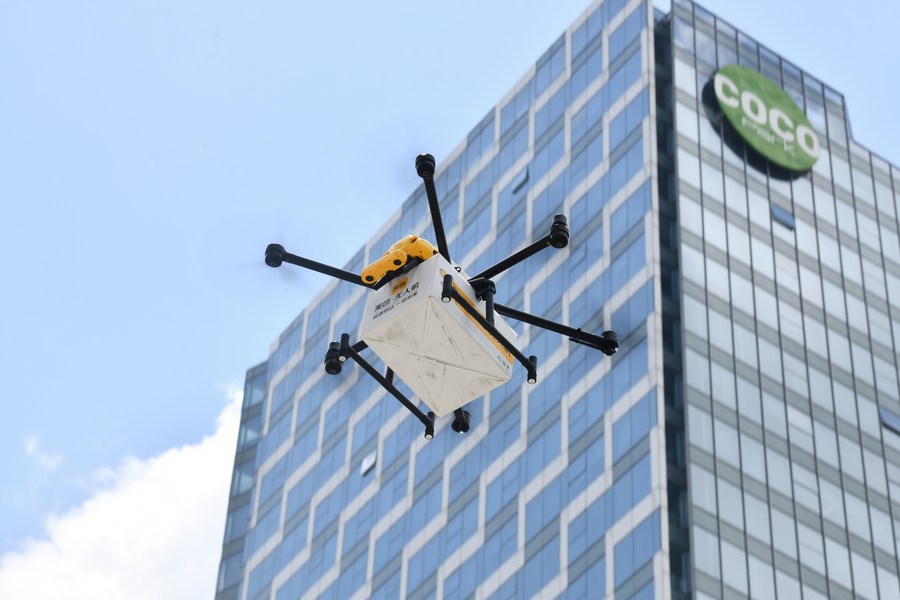




- BRNN
- BRI News
- BRNN News
- Database
Official Documents Polices and Regulations
Inter-government Documents International Cooperation BRI Countries
Business Guide Economic Data BRI Data
Trade
Investment Projects Latest projects
Cases - Content Pool

An unmanned food delivery drone works in Shenzhen, south China's Guangdong Province, Aug. 15, 2023. (Xinhua/Liang Xu)
The express delivery industry serves countless households, and as smart logistics continues to advance, the application of drones, unmanned vehicles, and unmanned warehouses at an accelerated pace is propelling China's express delivery sector into the era of intelligence.
Enhanced capacity, more scenarios, and broader coverage
At 10 a.m. on Oct. 25, along the shores of Yangcheng Lake in Suzhou, east China's Jiangsu Province, hairy crabs were harvested. A drone of Phoenix Wings, a cargo drone company under Chinese courier enterprise SF Express, loaded with the fresh crabs took off, swiftly reaching a transit hub in just four minutes at top speed.
Since the start of the lake's hairy crab harvest season on Sept. 25, drones have completed over 300 flights, transporting more than 2,700 kilograms of the crabs.
According to Chen Xiaohui, a director at Phoenix Wings, drone delivery service has not only boosted the efficiency of collecting fresh products, but it has also better met customers' demands for the timely delivery of fresh products. Through a delivery method combining drones and cargo planes, 10 tonnes of hairy crabs are transported from Yangcheng Lake to Southeast Asia daily, with an expedited delivery timeframe of just 48 hours.
"By the end of September this year, Phoenix Wings has set up 523 routes, conducted over a million flights, and delivered more than 5.2 million items," Chen said.
In April, express delivery company ZTO Express launched an unmanned vehicle operation platform, connecting over 100 branches in more than 40 cities with a fleet of over 200 unmanned vehicles in operation.
Unmanned technology has also made significant strides in warehousing.
In a smart warehouse of JD Logistics, the logistics arm of Chinese e-commerce giant JD.com, shelves loaded with goods move around. Upon closer inspection, the shelves are equipped with "legs" -- intelligent picking and handling robots powered by 5G technology.
"Don't be fooled by their small size; they are smart and strong. Once they receive an order, they can precisely navigate to the bottom of the shelf, lift it steadily, and deliver it to the designated area," explained an executive from JD Logistics.
The equipment can handle over 600 orders per hour, increasing efficiency by three to five times compared to traditional manual methods. It has been employed in over 10 smart industrial parks.
Policy support propels unmanned delivery into commercialization phase
"Unmanned delivery has evolved through three stages: initial exploration, technological breakthroughs, and commercialization," said an official from the State Post Bureau of China.
Unmanned technology has firmly taken root and flourished in the postal and express delivery sector, propelled by the surging market demand for deliveries. This demand has created a fertile environment for the effective adoption of unmanned technology.
"In recent years, China's e-commerce express delivery sector has experienced explosive expansion. This, together with the increasing consumer demand for fast delivery services, underscores the need to develop unmanned warehouses equipped with high-capacity storage and cutting-edge processing technologies," said an executive from JD Logistics.
Since 2014, JD Logistics has established over 40 intelligent logistics parks in more than 20 provinces, substantially reducing logistics costs and enhancing delivery efficiency.
"The development of the drone industry is closely tied to policy support," Chen noted.
In August 2017, Phoenix Wings completed the research and development (R&D) of the first generation of logistics drones with support of the East China Regional Administration of the Civil Aviation Administration of China (CAAC). Later, the company was granted the first operating license to conduct experimental drone deliveries.
Enhanced technological capabilities unleash market potential
Data reveals that by Sept. 29, the revenue of China's express delivery sector exceeded one trillion yuan (about $140 billion), reaching the milestone nearly one and a half months earlier than in 2023.
Driven by rising demand, proactive efforts made by the industry, and a growing level of public acceptance, significant progress has been achieved in unmanned technology. This includes notable developments in autonomous navigation, intelligent control systems, and obstacle avoidance capabilities, according to an official from the State Post Bureau of China.
Technological innovation has empowered companies to quickly respond to market demands.
Drones have evolved significantly over the years, with better flight stability, longer flight times, precise positioning, and enhanced payload capacity. These improvements have made drones more efficient and safer for managing logistics delivery tasks, according to the person in charge of drone operations at China's e-commerce platform Meituan.

Tel:86-10-65363107, 86-10-65368220, 86-10-65363106